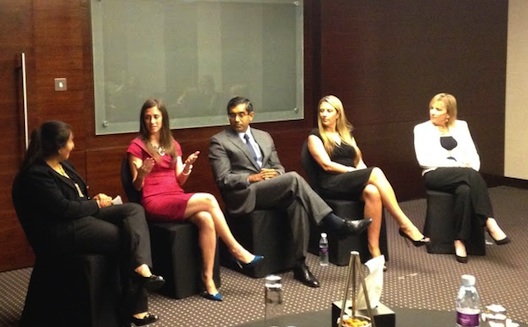How can the Arab world’s startup ecosystem work against gender discrimination?


If the global financial system had had more women in decision-making positions, would history have taken a different course? Women at the 2nd UAE Women Leaders Program debated this topic, during an evening session last Monday, which was part of a two day women’s leadership program using methodologies from Harvard University and U.S. Corporates. The event brought together several of Dubai’s leading entrepreneurs and businesswomen and men for a session titled “What if Lehman Brothers had been Lehman Brothers-Sisters?”
Organized by Sadaffe Abid, who has facilitated microfinance for over 300,000 women through a social enterprise startup in Pakistan, and Henna Iman, who has worked in leading roles at Proctor and Gamble and Novartis, who together run Transformational Leadership, the discussion united several of Dubai’s leading businesswomen and entrepreneurs, with a panel that included Amanda Line, Partner at PriceWaterhouseCoopers; Donna Benton, Founder/CEO of The Entertainer Group; Ali Asghar, Founder/CEO of Emerging Circle crowdsourced debt; Noor Sweid, Founder of Zen Yoga and Middle East Chapter Head of 85 Broads.
As panelists debated whether the collapse of Lehman Brothers would have happened if more women had been in decision-making positions, they identified a list of skills that women often bring to the workplace and the boardroom that not only prevent crises, but also facilitate growth and company development. These included:
- Taking a more holistic approach – women have a
greater tendency to look at multiple angles for a problem, and find
more creative solutions, and are especially likely to find
solutions that deliver on the ‘triple-bottom-line’
- Bringing a more diverse perspective overall –
when everyone in the room has the same background, the ability to
see a situation from multiple perspectives is limited, and
opportunities and solutions are missed.
- Being more considerate of the needs of people
– several panelists explored how women are more likely to factor in
the needs of stakeholders, customers, or other constituents into a
decision, where all-male boards are more likely to make purely
economic decisions.
- Stabilizing the environment – Abid pointed out that women are quite good at resolving conflict and being ‘stabilizers’ for things going awry. If they can hone their diplomatic skills, women are often well-positioned to negotiate compromises and resolutions in difficult situations.
Cultural differences between female leaders from the Gulf and
from outside the Gulf were also highlighted as a major factor
influencing the way that women approach the attainment of
leadership positions.
For example, in the cases of successful Middle Eastern women, it
was often the influence of supportive, strong men such as fathers
and husbands that facilitated their work experience and
independence, as the men in their lives often negotiated to share
domestic duties. Yet for successful women from outside of the
Middle East, a more dominant factor was the availability of
scheduling flexibility and domestic help, which allowed them to
pursue leadership in careers while raising families, often not an
option back home.
Donna Benton of The Entertainer highlighted one of the advantages to having a female at the helm: as CEO, she’s in a position to factor in the needs of female employees in a way that many male leaders would not, she argued.
Of course, not all female employees will have this benefit. For those operating in male-dominated environments, the panelists encouraged being proactive about breaking into the in-groups: inviting themselves to the male-only lunches, golf outings, or meetings if they are overlooked. Getting a mentor and internal support system (“your own personal board of directors”) was also strongly encouraged.
Why is this important? And why is this important in tech? Recent scandals and accusations against some of the biggest names in Silicon Valley have underscored the importance of a culture that is more inviting than inhospitable toward women in tech. From accusations of gender discrimination and employee harassment at programmer startup Github, to a sexual harassment lawsuit against VC Kleiner Perkins, to an anti-misogyny social media campaign, these allegations have been not merely disastrous for the specific companies involved, but also damaging to Silicon Valley’s image as a global standard for innovative culture.
These current challenges may be the sign of a shifting culture. As many Silicon Valley founders have received degrees from male-dominated engineering departments and worked in mostly male-dominated tech companies, they simply may not have had to worry much previously when it comes to the inclusion of women. But today, the conversation is very much on the table.
The benefit of a culture that is truly inclusive of women goes far beyond avoiding lawsuits. Most startups sell to both men and women, and an all-male team reflecting only half your customer base can put a company at a serious disadvantage in the market. Further, if everyone on the team has the same background, looks at things the same way, and has the same ideas, the ability to innovate may not be very high.
The prevalence of women in entrepreneurship in the Middle East suggests that startups should tackle these issues as early as possible, in order to engineer a truly efficient, diverse, and meritocratic culture.


